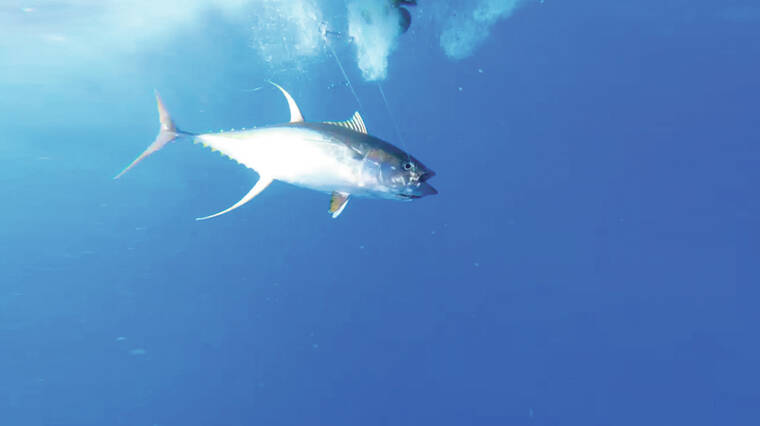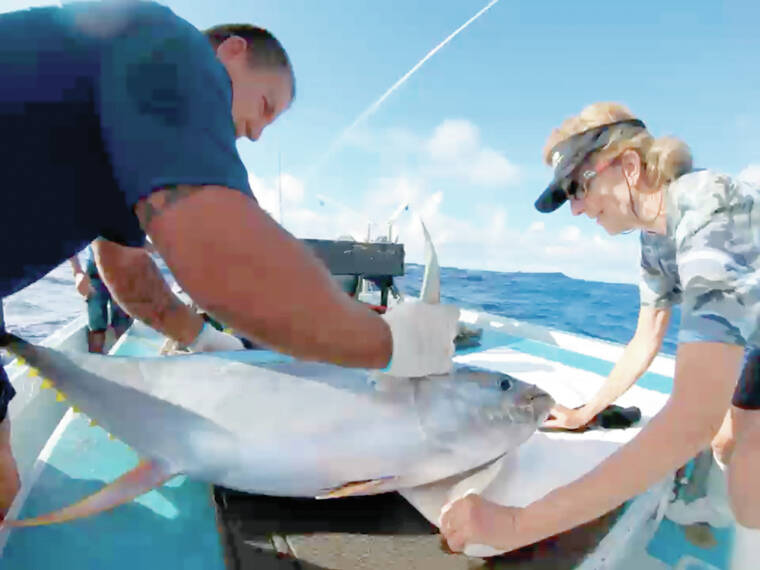PORT ALLEN — Local fishermen did not drop $16,000 of equipment into the Pacific Wednesday morning.
It was a rare disappointment for the captain and crew of the fishing vessel Yukie-Lynn.
“Almost every time we’ve gone out previously, we always were able to meet our mission in one day,” researcher Dr. Molly Lutcavage told The Garden Island.
Lutcavage and Capt. Kevin De Silva had planned to deploy four, $4,000 pop-up satellite archival tags on four fresh-caught ahi (Pacific yellowfin tuna, Thunnus albacares).
The research partners’ tagging efforts are the basis of a years-long project affiliated with the nonprofit Pacific Island Fisheries Group.
Scientists and fishermen want to learn where ahi go when not swimming in Hawaiian waters during spring and summer.
A 2020 paper co-authored by Lutcavage found unexpectedly complex movement patterns among 19 tagged adult ahi, with some making long journeys throughout the Pacific. But none of the tags were able to record a full year’s worth of ahi activity due to predator interactions and hardware failures.
Twelve-month records are critical, according to Lutcavage.
“We’ve done it for striped marlin, we’ve done it for bluefin tuna and we’ve done it for bigeye tuna, where tags stay on a year,” she said.
“A year is the goal, because a year captures an animal’s full cycle of spawning, and then feeding, and then returning.”
The project’s record tag, deployed in June 2021, lasted six months.
Another 2021 tag belonged to an ahi that traveled even farther north, to a spot midway between Kaua‘i and the Aleutian Islands.
That’s where warmer waters meet colder waters in a front well beyond the main Hawaiian Islands.
“I think everyone just assumed they’re sticking around. And maybe some do,” Lutcavage said.
“But as soon as we had satellite tags, we were able to show — much like other tunas — that they go different places. You could put out six tags and they’ll go in six different directions.”
Now it’s time to deploy the four tags the ahi-tagging project has on-hand.
But Lutcavage and De Silva were stymied when no suitable fish were caught Wednesday.
“If you have a $4,000 tag, you certainly want to put it on the absolute best fish you can release,” Lutcavage explained.
De Silva fishes uses a short-set surface longline and circle hooks. The technique tends to yield untired, unharmed ahi: prime candidates for tagging.
When De Silva hauls an ahi aboard, he places the torpedo-like animal on a vinyl mat. A wet rag is then placed over the ahi’s eyes. This calms the ahi while a crew member — often De Silva’s grandson Cyrus Baltazar — takes measurements.
Meanwhile, De Silva implants a tag in the ahi’s dorsal fin. A DNA sample is also collected before the ahi is returned to the ocean.
The entire procedure takes less than 40 seconds.
Lutcavage has now returned to Massachusetts for the Atlantic bluefin-tuna season. She’ll miss fishing off Kaua‘i, but knows the Yukie-Lynn will get the job done.
De Silva himself is in no rush. The captain knows what he wants.
“I’m going to be really choosy and get some really, really healthy fish before I put the tags out,” he said.
Ahi Hub
Lutcavage left Kaua‘i with another tuna-related project, Ahi Hub, in progress.
The federally funded project is an effort to increase the availability and market value of Kaua‘i-caught ahi. It began in earnest this spring, with a series of online workshops between local and mainland commercial fishers.
Workshop panelists, including celebrity Capt. Dave Marciano of the National Geographic TV show “Wicked Tuna,” shared their experiences growing and diversifying small fisheries.
The workshops, while over, will be made publicly available at ahihubkauai.org and PIFG’s fishtoday.org by mid-July.
Ahi Hub will conclude with a published curriculum reviewing methods to create a greater small-boat fishery on Kaua‘i.
Options include a micro-cannery and a central fish-processing hub, such as a community dock with a certified commercial kitchen, to access a broader customer base.
“I’ve met with several individuals in the community that want to participate in getting this moving,” Lutcavage said.
“So even though officially the grant ends in July, we all agree that this is just the beginning of the effort.”
•••
Scott Yunker, reporter, can be reached at 245-0437 or syunker@thegardenisland.com.







